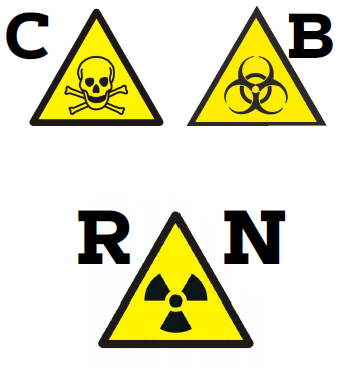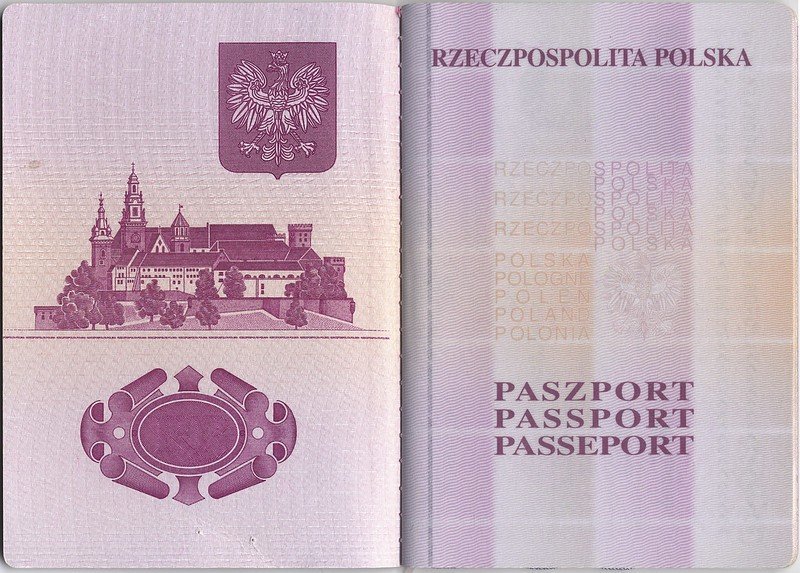The Official Guide about How to Survive in a War – Check here how it may be useful for YOU
Due to the military conflict in neighboring Ukraine, the Polish government issued a 36-page guide outlining how to survive in a war and what we (civilians) should do in this type of event.
The manual is in Polish, but I translated the most interesting points for this article. This is not an official translation.
The manual’s advice on how to survive in a war was written by specialists and is useful not only to Poles but to anyone living in a region threatened by military action.
It even includes instructions on what to do in the event of a radiological, chemical, or biological disaster.
RCB: Poland’s Emergency Management

The manual publisher was RCB. If you’ve lived in Poland for more than a few months, you’ve probably heard of this acronym. It is the Emergency Management System of Poland.
When a dangerous situation approaches, they have a system that automatically sends SMS messages to all Polish phone numbers, as well as messages across TV and radio channels.
Throughout my years in Poland, I received warnings about severe storms, blizzards, and even a local outbreak of the rabies virus (the RCB SMS told us to stay away from stray dogs and report to the authorities).
Now that you know who wrote the manual — people who know what they’re talking about — it’s time to get to the core of the matter. The first pages are more concerned with preparation, while the second half of the manual is concerned with what to do if a war has already begun.
The first step is family coordination.
Coordination at a family level on how to survive in a war

You increase your chances of assuring yourself and your loved ones’ safety by preparing for unusual situations and planning conduct in the event of a disaster or the occurrence of threats. You will also limit the tangible damage.
We should start preparing at the most personal level — the family.
- Designate the safest places in the house (most often the basement, far from the windows)
- Establish a contact place, in which you all will meet after an accidental separation (a place where everyone will be able to do so ).
- Prepare an evacuation backpack (more about it below) and home survival supplies to last at least 7 days without access to water, electricity, or food.
How to handle disinformation
False information appears more frequently in the media, social media, and messengers, mislead you, and impacts your assessment of the situation, events, phenomena, or people.
Remember that information can be used as a weapon, and you are its intended victim!
Resisting emotions and verifying the message are the best defenses against false information and propaganda. Before you believe something is credible, ask yourself the following questions:
- Is the statement’s author (source of information) known?
- Can the information influence your decisions?
- Is the information credible and present in at least two independent and reliable sources? Is the information widely disseminated?
- Is the information available through official channels of government communication or state security structures?
Spreading rumors and unproven information should be avoided; instead, use more than one reliable source to determine whether the information is true.
Crisis Communication
- Expect that phone communication will be limited during a crisis or war.
- Listen to the radio for official announcements.
- Maintain your cool, concentrate, and follow the official coordination. It has the potential to save your life!
- Dial 112 (in Poland) for assistance. Phones should only be used sporadically, to call family or close friends. Otherwise, communication lines may become overloaded, complicating the work of police, firefighters, and ambulance personnel and possibly risking the lives and health of hundreds of people. If you want to let people know you’re safe, send them an SMS.

Understanding Alarm Sirens
Alarm signals and warning messages are transmitted using loud alerting equipment, which includes sirens, megaphones, and bells (including church bells).
If a treat is detected (this is valid for Poland, since your country may have different patterns):
- Sirens will emit a modulated sound (up and down) for 3 minutes

- Radio and TV will announce the threat, and repeat it 3 times.
- A golden triangle may be broadcasted as a visual signal.
What you should immediately do:
- Stop working, and turn off all equipment, gas, and electricity.
- Turn on the radio and tune to a local station; if possible, follow the information on governmental pages.
- Follow your crisis coordinator’s orders.
If the alert is to be canceled (false alarm):
- Sirens will emit a continuous sound for 3 minutes.

- Radio and TV will announce that the alarm is canceled, and repeat it 3 times.
Regardless of the various methods and techniques for delivering an alarm or warning message, it is possible that people close to you will be unaware of the impending danger. People who live nearby who are elderly or sick can be at risk.
What can YOU do to help others in your neighborhood?
- Check to see if the people around received the information and provide actionable instructions.
- Inform neighbors as well as people who may be unaware of the dangers, particularly the elderly and the sick.
- During an evacuation, provide transportation to those in need.
- Organize a shelter for people who have been evacuated from the dangerous area.
How to Prepare an Evacuation Kit
During a crisis, there is a high risk of power, water, and food shortages. Make certain that you have everything in order ahead of time.
To save time and ensure that you take everything you need in good time, start by the preparation of an evacuation kit, which will assist you in your first days away from home. Your goal is to make it through the week.
Important! Each member of the household should have their own backpack with the most essential items. Attach a name and address card to the backpack.
What should an evacuation kit contain?
Ascertain that your loved ones are aware of the location of your evacuation kits, which should contain:
- Radio + batteries
- Flashlight + batteries
- The most necessary documents — ID cards, deed of ownership
apartments and other valuable assets, basic medical information,
insurance certificate, birth/marriage/pension certificates. Copies and digital files on a flash drive. - Whistle
- Lighter / matches
- First aid kit (paracetamol,
ibuprofen, drugs against diarrhea,
nausea, vomiting, electrolytes,
thermometer, gauze, etc) and respiratory masks. - Map with local roads, compass, and GPS.
- Can opener, cutlery set, meals for 2 days, and knife
- Pencil, and notebook.
- Rainproof Jacket and a change of clothes
- Trash bags, soap, and disinfection gel.
- A good amount of cash — it is possible that
you will have to buy food and fuel. - Sleeping bag
- Crowbar, multi-tool box.
- Water bottle with filter.
Stocking Food and Water
You must be prepared to secure alternative access to water because, during a crisis or war, it can be hampered. Stock 14 liters of water for each inhabitant of the house — this will allow you to survive a week without a running water supply.
Food for emergencies should be stored in a cool and dry location. Avoid stockpiling products that need to be refrigerated or heated before use. Prepare products with a long expiration date that can be eaten cold, such as bars, canned food, ready meals (bigos, meatballs, beans), and dry bread.
How to Proceed during Evacuation
The evacuation can be either voluntary or mandatory. So, how should you prepare for it?
- In the event of an emergency, go to the safest place in the building — it’s best to seek refuge in a room away from windows and doors.
- Maintain fuel reserves or refuel the car to full at the nearest station; make sure you have a spare tire and know how to replace it, and be prepared for the GPS to fail. Stock up on maps and map out primary and alternate travel routes.
- Establish a contact point with your family members to which you will go in the event of an accidental separation (a location to which everyone will be able to get through without difficulty).
- Before evacuating, change into protective clothing, including a jacket, thick-soled shoes, a cap, and cargo pants. Avoid brown, green, and camo backpacks unless you want to be mistaken for a soldier!
- Take a prepared emergency backpack (more about it in previous paragraphs).
- Before leaving, secure your home by turning off the water and gas valves, disconnecting all electrical appliances, removing products from the refrigerator and freezer, and locking the door with a key.
- Prefer to travel in only one car with your entire family. This will reduce the possibility of separation.
Evacuation routes
- Follow the orders of the services in charge of the evacuation; use recommended routes— other roads may be blocked.
- Be cautious when driving on bridges and viaducts, and avoid driving under high-tension wires.
- Avoid unknown roads and those with particularly important buildings (this includes not only military facilities but also power plants or TV/Telephone towers).

What to do if you hear gunshots
The most important thing is to get out of the way of the shooter, as far as you can. If possible, inform others about the location of the attacker.
If you can’t get away, hide. Use the terrain and available obstacles to your advantage (walls, metal beams, structures). Mute your phone, barricade the door, lower the blinds, and turn off the light. Try to keep calm.
Avoid hiding in groups. The presence of 5 people locked in a closet increases the likelihood of some undesired noise!
If your attempt to escape or hide fails, you must fight. Make the most of your abilities.
Also, remember the lessons of first aid. Ensure that you recall how to stop a bleeding injury, mouth-to-mouth resuscitation, etc.
What to do in the case of an explosion
Good preparation and preventive action are required to increase your safety in the event of an explosion.
Consider the best shelter in the places you frequent (work, school, and home). You’ll need a room with thick walls, no glass windows, but some air circulation — unless the explosion involved CBRN hazards, in this case, air circulation is not indicated. See more about CBRN below.
The basement is usually the safest place to be; have an emergency kit on hand and be prepared to evacuate.
When you witness the explosion:
- Drop to the ground and cover your head with your hands;
- Seek shelter and don’t leave it immediately after the explosion.
- In the case of evacuation, avoid using elevators and take the stairs to the emergency exit.
CBRN

CBRN is an abbreviation for weapons of mass destruction: chemical ( C), biological (B), radiological (R), and nuclear (N). CBRN substances or weapons often cause severe illness and death.
Biological and Chemical Weapons and Substances
What should you do if you come into contact with a hazardous chemical?
- Protect the respiratory system and the skin.
- After leaving the contaminated area, take a shower and change into clean clothes. Pack dirty clothes in a plastic bag and transport them away from your location.
- Seal the windows, doors, and ventilators. Turn off any fans or air conditioners.
- Don’t go outside just for the sake of going outside, remain in the building.
Biological Weapons and Substances
- Remove yourself from the contaminated area.
- Protect the respiratory system and skin — if there is a possibility of coming into contact with dangerous biological substances, a protective mask can help reduce the risk of contamination.
- Hand hygiene and disinfection are essential.
- Take a shower and change into clean clothes. Dirty clothes should be placed in a plastic bag and removed from the location where you are.
- Close all windows and doors, and turn off any fans or air conditioners.
Radioactive and Nuclear Weapons and Substances
- To avoid irradiation, take shelter in the nearest building. If possible, seek refuge in a basement, shelter, underground parking garage, or subway.
- Keep a safe distance between yourself and the outside walls.
- If you return from a contaminated area, take a shower and change into clean clothes. Pack dirty clothes in a plastic bag and remove them from the location where you are.
- Avoid eating or drinking anything that has been exposed to radiation.
- Remain inside. Close all windows and doors, and turn off all fans and air conditioners.
- Use the phone only in exceptional circumstances.
- Control your emotions and don’t panic — you’ll save energy by reducing unnecessary air consumption in a closed room.
- Pay attention to messages from services and the media, and follow official recommendations.
- Unless otherwise directed by the services, stay inside for at least 24 hours.
What to do if there is lack of electricity
- Prepare to have an alternative power supply — a power generator
and reserve fuel will ensure long-lasting access to electricity. - In the event of an evacuation, it will be extremely useful to have loaded
power banks and a car electric charger. - Limit Your Cell Phone Use — turn off WI-FI, data package, and turn on the energy-saving mode.
- Make a list of the most necessary things powered by electricity and prepare a kit of matching batteries. Remember
to have a battery-powered radio. - Prepare a flashlight, candles, matches, and lighter.
- Secure the right amount of cash that will help you get through the first days, because ATMs may not work if electricity is interrupted.
How to behave in the presence of foreign soldiers/temporary loss of terrain
- Keep calm; if you see soldiers on your way, choose an alternate route and avoid unnecessary contact.
- Avoid getting closer to foreign cars and military hardware if you don’t want to be identified as a spy.
- Do not photograph or videotape the soldiers as this may provoke them to become aggressive toward you.
- Do not put your hands in your pockets or make sudden movements during a conversation.
- Do not argue with someone armed;
- Have documents on hand.
- Don’t look around, and don’t talk to anyone.
In the event of temporary occupation by an invading force and the implementation of new rules:
- Fill bottles, pots, and even a bathtub with water. Obtain water from a well if possible
- Use the stockpiled food or food that has been distributed as part of the humanitarian aid.
- Even if a local store has been raided, food can still be found there.
- Don’t go out after dusk if you don’t have to — everyone will think you’re a spy.
- Wear neutral colors with no symbols or emblems.
- Find some company. It will be easier for you if you work together with others, and you will have a better chance of defending yourself.

Other pieces of information in the polish guide on how to survive in a war.
The manual also has other pieces of information regarding what to do if you become a hostage, and about first aid procedures, as well as the template of a checklist of things to put in your evacuation backpack and a template of emergency phone numbers.
The complete manual can be downloaded here.
If you liked this article about the Polish guide about how to survive in a war, check this one about how to react in case of war.
I also wrote two other articles about the war in our neighbor at Ukraine and the refugee crisis here in Poland:
3 Touching Stories About Ukrainian Refugees I Witnessed in Poland
Sleeping in Warsaw Became More Expensive Than in Monaco
First, subscribe (for free) to receive my articles directly in your inbox and receive as a special gift the digital book 20 Essential Hacks for Saving Money While Travelling.
Second, if you liked this article, please consider supporting me and other writers by becoming a Medium member. By using this link, you will directly support me with a piece of your fee; there will be no additional cost to you. Thank you a million times if you do!
Levi Borba is the founder of the Expatriate Consultancy, creator of the channel Small Business Hacks and The Expat, and best-selling author.




